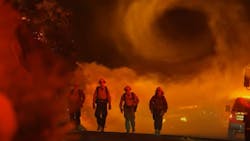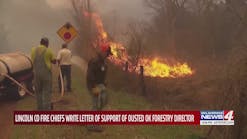Doc Looks at CA Wildfires Through Eyes of Firefighters, Residents
By Peter Larsen
Source The Orange County Register
Documentary filmmaker Lucy Walker rose early on the morning of Nov. 8, 2018.
Editing on her latest project, a short documentary inspired by the Thomas Fire a year earlier, had just begun and Walker, who'd previously been nominated for Academy Awards in both the feature and short documentary categories, had calls scheduled with her collaborators on the new film.
"So I was on a conference call with our original financiers and producers, a couple of them, and saying, 'Hey, so here's the status update,'" says the British documentary who now lives in the Venice neighborhood of Los Angeles.
The conversation remains clear more than two years later.
"It's kind of the end of fire season," she told them. "Fire season officially ends today, but there is this terrible weather, so I'm not sure if it's quite over yet."
Still on the call she decided to check social media for any new reports or footage of California fires.
"As I went onto Twitter, I saw the Camp Fire kicking up that morning," Walker says. "It was a really early conference call, it was 7 a.m. or 8 a.m., right when the Camp Fire was taking off.
"And I was like, 'Oh gosh, we have really bad fires kicking off, so let's get off the phone.'"
The Camp Fire in and around Paradise in Northern California killed at least 85 people and caused billions of dollars in damage. The Woolsey Fire, which started that same day, killed three people and burned hundreds of homes in Malibu and the surrounding areas.
That morning, Walker and a small crew hit the ground filming, eventually shifting focus from the planned shorter film to the feature-length "Bring Your Own Brigade," which arrives on Friday, Aug. 6.
The film looks at both the Camp and Woolsey fires through the eyes of the people of Paradise and Malibu, shifting moods from hopeless to hopeful over the course of two hours.
Walker traveled extensively between the two fire zones for weeks and months after the blazes were contained, working to "get out of my own bubble and meet people a little bit different than me," she says. "And in Paradise, to have quite different political views than me.
"You see in the film that I'm chatting to a guy who tells me that climate change is a hoax," Walker says. "And then there's this moment where he looks at me and says, 'Where are you from?' and I suddenly felt very exposed and then oh my gosh, he's busted me. He's realized I'm not somebody that thinks climate change is a hoax."
Yet even then, her openness to all the film's subjects seeds communication, and eventually some slice of common ground.
"And I think that's what we're going to need to solve big problems like this fire crisis that we're having around the world," she says.
Baptism by wildfire
Like most newcomers to California, Walker experienced her baptism by wildfire the first time she saw freeway traffic untroubled as swirling flames swept across an adjacent hillside.
"I'm always weighing would it make a great film," she says of her first inchoate thought to point a camera at the flames. "Because sometimes things would be fantastic magazine articles or text books or podcasts or whatnot, but they're not going to make a great movie.
"I'm weighing, 'Is this a subject that's personally so interesting and fascinating to me that I am going to get obsessed?'" Walker says. "And has anyone else done it already, because if so, let's relax and watch that film, right?
"At the time, there was nothing that was done on the subject, which I thought was very surprising because there are so many wonderful filmmakers in California."
As fire seasons came and went, the problem seemed to worsen, she says.
"And the more I thought about it, I thought, 'Well, gosh, maybe it's me,'" Walker says. "Maybe this was the time and place for me to dig into my own life for the first time rather than flying off to Brazil or Japan. Maybe this was time to think about my own milieu and terroir, so to speak."
In 2017, when the Thomas Fire hit Santa Barbara and Ventura counties, Walker and a small crew embedded with firefighters there, gathering material for the original short film she envisioned. At the time it was the biggest fire in California history, though soon the Mendocino Complex Fire overtook it for that ignominious distinction.
"I thought, 'Well my gosh, it's not enough to have a film about one fire if there's been an even bigger one since,'" she says. "It's clearly a bigger, more urgent problem, and I want to understand all of it. Not just the one fire, but let's get at the big picture."
Raw honesty from firefighters and residents
"Bring Your Own Brigade" opens with Brad Weldon, a Paradise man who instead of evacuating, stayed at his house with his disabled 90-year-old mother to fight the fire.
There's a moment in those first scenes when Weldon tears up at the memory, and how he and his mother believed angels, and particularly his late wife, were on their side that day.
The raw, honest realness of many of those interviewed — residents, firefighters, and fire experts — makes for a moving picture of life before and after fire and build emotional bridges to viewers.
"I don't like dry talking head films," Walker says. "I always want to watch character-driven narrative, exciting, moving, emotional stories. And what I really like as well is really authentic people, and salty and surprising and the real truth.
"None of that phony pretending; the polite stuff, you know, is really boring. I don't like boring stuff."
Often working with just a crew of two, camera and sound, allowed her to approach strangers and get them to open up.
"Those people that have that gift of being able to share, honestly, vulnerably, angrily, whatever it is, but just let it all hang out — that's what I'm casting for," Walker says. "So it's very human on human."
Many moments and people linger long after the film is finished. The Malibu man left homeless by the fire. A new mother in Paradise who when she thought she might die trapped on an evacuation route told her driver to take her baby and run if it came to that.
There's the Malibu man who gives the film its name, saying that his home was lost when firefighters were overwhelmed by the size of the blaze, and the only way to save it would be to "bring your own brigade," and a fire official who tears up as he talks of the psychological toll, including PTSD and suicide, that firefighters have experienced in this new age of fire.
"That's for me even more interesting than a fabulous script and fabulous actors," Walker says. "Because for me, that's an opportunity to kind of get a glimpse at how life works."
The movie ends with Weldon moving on. His mother has died since Walker first started filming the family. He's fallen in love with a neighbor, and their marriage is part of the final moments of the movie. The intimacy forged in the sensitive approach of Walker's work allows her to capture it all.
"When I asked him, 'Why did you do this?' — because I could not believe that anyone would not have run away from those fires, because I had a panic attack when one was over the hill from me — and he broke down and explained about his late wife, that was an example of how you can spend more money and have a bigger crew, but I don't think you can get more of the power of cinema," Walker says.
"When people really bring it personally, there's nothing that beats it."
___
(c)2021 The Orange County Register (Santa Ana, Calif.)
Visit The Orange County Register (Santa Ana, Calif.) at www.ocregister.com
Distributed by Tribune Content Agency, LLC.






